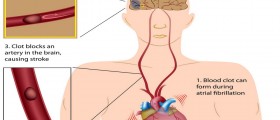
“Blood thinners” or anticoagulants are the kind of medication used to prevent the blood clots. Warfarin (Lawarin, Waran, Coumadin, Jantoven, Marevan) is one of those drugs, affecting the clotting proteins and preventing blood clots. Heart attack, some arrhythmia and heart surgery patients are prone to develop a blood clot.
The dosage of the medication is suited to every individual patient. Some laboratory tests (PT-prothrombin time and INR -international normalized ratio tests) might be necessary to monitor the medication. Use the medication exactly as the doctor prescribed it. Do not increase the dosage, use another similar medicine and stop the medication unless consulted with doctor.
Side effects of warfarin are usually not serious, including nausea, vomiting, loss of appetite, and abdominal pain and cramps. In case some of the symptoms worsen or become persistent notify your doctor or pharmacist. Yellowing of skin and eyes and increased pain in the stomach might be serious.
Rash, swelling, dizziness and problem with breathing are signs of an allergic reaction to warfarin.
Bleeding is one of the symptoms that should be taken more seriously. Any bleeding lasting more than normal (heavy period), bleeding from the nose or gums, unusual bruising and pain should be reported to your doctor. Severe headaches, blood in urine and feces are also symptoms not to be ignored.
A severe and rare side effect of the warfarin use is gangrene (serious tissue damage). Sometimes, a part of solid cholesterol could block the blood vessel and stop the blood supply to the part of the body. Painful rash, foot ulcers or purple toe, severe back or muscle pain, confusion and vision changes may indicate that blockage. If that happens inform your doctor immediately.
Before start of the warfarin treatment inform the doctor of all your illnesses and conditions and report all used medications and remedies. Your medical history and medical history of your family may be relevant for the use of this medication.
Alcohol should not be used while you are on the warfarin therapy, because it increases the risk of bleeding.
Avoid any intramuscular injections, or take it in your arm, if necessary.
When you’re suffering from a disease that cause you to vomit, have fever or diarrhea, consult the doctor about your warfarin treatment.
Avoid any contact sport, for it might lead to injuries. Also, avoid razor or tooth injuries and inform your dentist that you are using warfarin.
Old people are more sensitive to the effects of warfarin and the caution is necessary in those cases.
Warfarin affects the fetus and thus should not be used in pregnant women. The medication is not transferred into the breast milk, but nursing moms should discuss the use of warfarin with their doctor.

















Your thoughts on this
Loading...